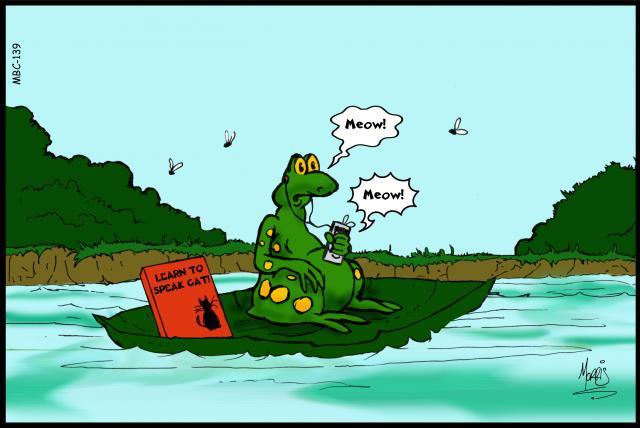1. The Bow-Wow Theory. According to this theory, language began when the first humans started imitating the sounds around them. The first speech was onomatopoeic - marked by echoing the sounds they hear; moo, meow, splash, cuckoo, and bang. Sounds good, right? What's wrong with this theory is that the sound of a dog barking, for instance, is heard differently in different places; in Brazil it's au au, in Albania it's ham ham, and in China, it is wang wang. Too, there are many onomatopoeic words that are not derived from natural sounds.
2. The Ding-Dong Theory. I want to point out here that I am not making up these names! That said, this is the theory that Plato and Pythagoras believed to be true. This theory "maintains that speech arose in response to the essential qualities of objects in the environment. The original sounds people made were supposedly in harmony with the world around them." So what's wrong with this idea? Experts say that apart from a few rare instances of sound symbolism, there's no hard or believable evidence "in any language, of an innate connection between sound and meaning."
3. The La-La Theory. The Danish linguist Otto Jespersen suggested that language may have developed from sounds associated with love, play, and (especially) song. And the problem with this theory? It still "still fails to account for "the gap between the emotional and the rational aspects of speech expression," according to David Crystal in his book, How Language Works.
4. The Pooh-Pooh Theory. Is it me, or are these names just getting weirder? Anyway, this theory states that speech began with interjections like "spontaneous cries of pain ("Ouch!"), surprise ("Oh!"), and other emotions ("Yabba dabba do!"). Just kidding on that last one. There is a flaw in this theory, too, just like with the others. "No language contains very many interjections, and, author David Crystal points out, 'the clicks, intakes of breath, and other noises which are used in this way bear little relationship to the vowels and consonants found in phonology.' (The branch of linguistics that deals with systems of sounds in a particular language."
5. The Yo-He-Ho Theory. What, the soldiers in the Wizard of Oz came up with this one? Actually, according to this theory, language evolved from the grunts, groans, and snorts evoked by heavy physical labor. And is there a flaw in this theory? You bet! "Though this notion may account for some of the rhythmic features of the language, it doesn't go very far in explaining where words come from."
So does this mean that all questions about the origin of language are unanswerable? Not necessarily. Over the past 20 years, scholars from such diverse fields as genetics, anthropology, and cognitive science have been engaged in "a cross-discipline, multidimensional treasure hunt" to find out how language began." ig could possibly be the hardest problem in science today.
And here's a little bonus information for you this morning. We may not know exactly how language began, but we do know which languages are the ones most spoken.
The list:
- Chinese/Mandarin—37 countries, 13 dialects, 1,284 million speakers
- Spanish—31 countries, 437 million
- English—106 countries, 372 million
- Arabic—57 countries, 19 dialects, 295 million
- Hindi—5 countries, 260 million
- Bengali—4 countries, 242 million
- Portuguese—13 countries, 219 million
- Russian—19 countries, 154 million
- Japanese—2 countries, 128 million
- Lahnda—6 countries, 119 million
PEACE.
2. Rosenberg, Matt. "Top 10 Most Popular Languages." ThoughtCo, Jul. 5, 2018, thoughtco.com/most-popular-languages-1434469.

 RSS Feed
RSS Feed